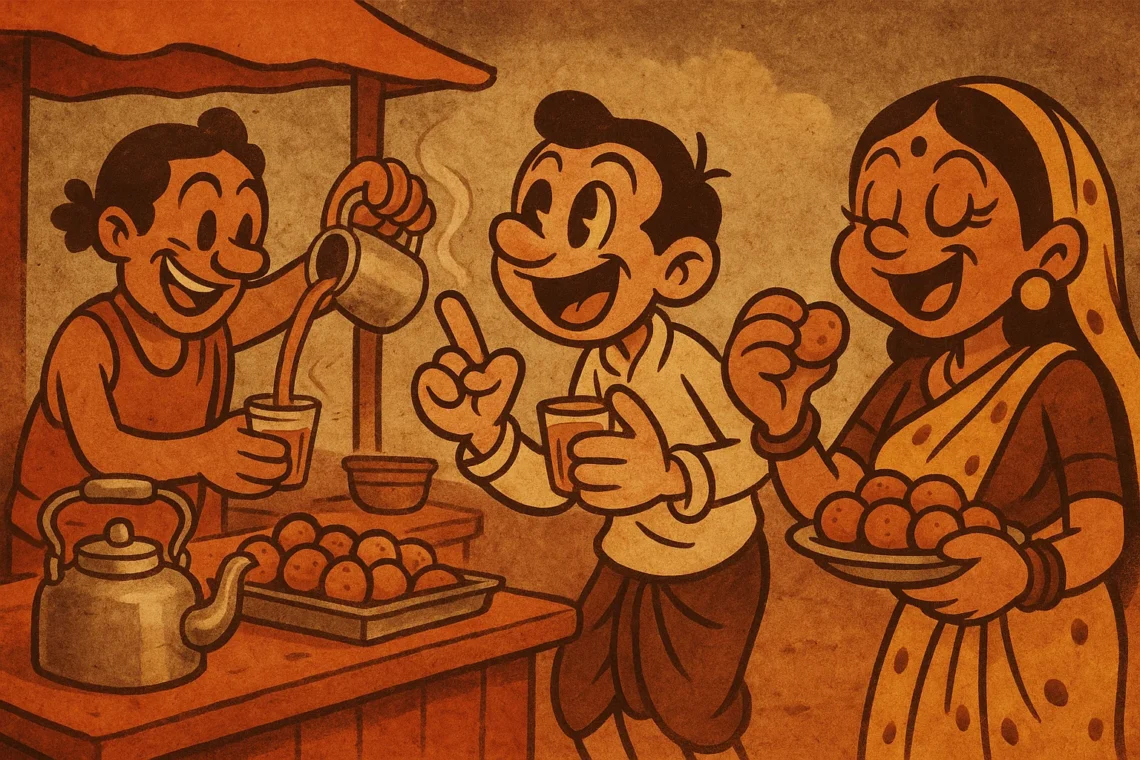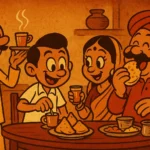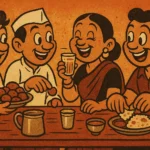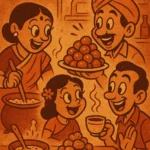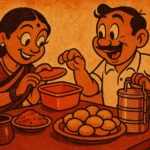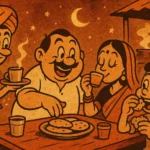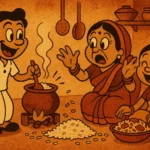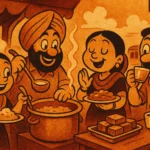There’s a place in every bustling Indian city where the hum of daily life blends with the comforting aroma of brewing chai. It’s not a café, not a fancy bistro—no, this is the chai tapri (stall) by the roadside, where you’ll find a humble, unassuming kettle of tea simmering over a smoky flame, surrounded by mismatched plastic chairs and scattered newspapers. But don’t let its modest appearance fool you. The chai stall is one of the most powerful places in any community. It’s where stories are told, secrets are spilled, and lives are shared, all with the simple exchange of a cup of tea.
I spent many mornings of my youth at these stalls, and now, from my kitchen in Austin, I can still feel the magic of those moments. What struck me most about the chai stall was how much it knew about people. While therapists charge a hefty fee for sessions, the chaiwala (tea seller) is the true confidant. He’s there, every day, listening to the city’s heartbeat, gathering fragments of lives, quietly observing the world. And somehow, without even asking, you’d end up spilling your own secrets over a cup of chai.
The Unassuming Therapist: Chai and Confidentiality
The beauty of the chai stall is its unpretentiousness. There’s no therapy couch, no hushed whispers, and no judgment. Yet, it offers something far more profound: a space for people to unload their burdens, express their hopes, and laugh at their woes. You don’t need an appointment to spill your heart out here. A chaiwala, in his crisp, simple manner, has an uncanny way of making you feel comfortable, like everything you say is taken with a pinch of salt, yet never dismissed.
There’s a fascinating mix of people who come to the chai stall—students, office workers, elderly men, and even young mothers with children in tow. Each one brings their own flavor to the place. Some come to seek answers, others just for a moment of respite. And what’s interesting is that while everyone’s there for the tea, they often leave with a little more than just a caffeine fix. Sometimes, it’s an epiphany. Other times, it’s just a moment of human connection. Either way, the chaiwala stands at the center, serving tea and wisdom in equal measure.
The Stories You Won’t Hear Anywhere Else
It’s not just the regulars who reveal their stories, either. Tourists, newcomers, and even people passing by are drawn to the chai stall. The conversations here are raw, unfiltered, and authentic—like the perfect cup of masala chai. There’s no pretense, no expectation. You’ll hear stories of love, loss, success, and failure. A man nursing his cup may tell you about the heartbreak of leaving his hometown, while a student, balancing books and a part-time job, might share her dream of becoming a doctor.
The beauty of the chai stall is that there’s no obligation to listen. You can tune in or zone out, sip your chai in peace, or chime in if the mood strikes you. Yet, over time, you become a part of the silent community. The chaiwala remembers your name, your usual order, and the subtle changes in your mood. It’s a connection without demands—much like the tea itself, which is simple but potent, giving you what you need without ever asking for much in return.
The Magic of the Ordinary
What’s remarkable about these stalls is how ordinary they are, yet how magical they feel. The chaiwala’s stall doesn’t need to be anything special—it’s just a few metal vessels, a hot plate, and a steady hand. The cup of tea they serve is often simple—just tea leaves, milk, sugar, and maybe a sprinkle of masala, yet it somehow tastes like home. This is a place where the mundane meets the magical. A sip of tea becomes an invitation to relax, to open up, and to savor the moment.
Every chai stall, no matter where it’s located, holds a unique charm. There are those in Mumbai that line the railway platforms, bustling with energy as trains whiz past. Others are tucked away on street corners, offering a brief respite from the chaos of the day. And then there are the ones in small villages, where the sound of a tea kettle signals the start of a conversation, a community moment, a pause in the day. In each of these places, the tea connects people in ways words often can’t. It’s a shared ritual, a universal experience. It’s as if the magic of the chai stall transcends its simple ingredients—just as the conversations it hosts transcend their fleeting nature.
The Chai Stall as a Cultural Landmark
In India, chai stalls are more than just places to grab a quick cup. They are cultural landmarks. They are where ideas are exchanged, deals are struck, and friendships are formed. Whether you’re meeting a friend after work, negotiating a business deal, or simply killing time before a train departs, the chai stall is where you do it. It’s a place that doesn’t ask much from you, but gives so much in return—whether it’s the warmth of a well-made cup of tea or the company of strangers who, for a moment, feel like family.
What makes these chai stalls so special is their intimacy. There’s no need for small talk; you can sit in silence, watching the world go by, or chat about everything and nothing. It’s a space where nothing is forced, and everything feels effortless. In a world that’s often too busy, the chai stall is a place that slows time down, where life can be enjoyed one sip at a time.
More Than Just Chai
So, why do we gravitate toward the chai stall? Why do we keep returning to these humble spots despite the lure of fancy cafes and hipster coffee joints? The answer, I think, lies in the fact that chai stalls represent something deeper. They represent simplicity, connection, and authenticity. There’s no pretense, no rush, just a hot cup of chai and the space to be yourself.
Perhaps it’s the feeling of shared humanity that makes the chai stall so special. In a world that often feels disconnected, these little roadside havens remind us that sometimes the most profound connections are made over something as simple as a cup of tea. So, next time you find yourself at a chai stall, take a moment to soak in the atmosphere. You may just find that it’s the most genuine moment of your day.
Born in Mumbai, now stir-frying feelings in Texas. Writes about food, memory, and the messy magic in between — mostly to stay hungry, sometimes just to stay sane.

